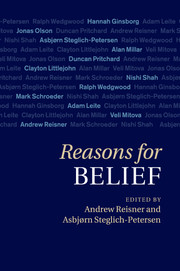Book contents
- Frontmatter
- Contents
- Contributors
- Preface
- Introduction
- PART I NORMATIVE REASONS FOR BELIEF
- 1 How to be a teleologist about epistemic reasons
- 2 Is there reason to be theoretically rational?
- 3 Epistemic motivation
- 4 Error theory and reasons for belief
- 5 Can reasons for belief be debunked?
- PART II REASONS AND EPISTEMIC JUSTIFICATION
- References
- Index
5 - Can reasons for belief be debunked?
Published online by Cambridge University Press: 05 July 2011
- Frontmatter
- Contents
- Contributors
- Preface
- Introduction
- PART I NORMATIVE REASONS FOR BELIEF
- 1 How to be a teleologist about epistemic reasons
- 2 Is there reason to be theoretically rational?
- 3 Epistemic motivation
- 4 Error theory and reasons for belief
- 5 Can reasons for belief be debunked?
- PART II REASONS AND EPISTEMIC JUSTIFICATION
- References
- Index
Summary
THE CLASSIC DEBATE: EVIDENTIALISM VS. PRAGMATISM
Tom has mounting evidence that he has incurable cancer, but he also believes that he would be happier, regardless of the truth, were he to believe that he is healthy. W. K. Clifford, who famously claimed, “It is wrong, always, everywhere, and for anyone, to believe anything upon insufficient evidence,” would, depending upon the strength of Tom's evidence, direct him to believe that he has incurable cancer, no matter the results for his happiness. The pragmatist William James, on the other hand, might deem this one of those situations in which it is permissible to follow one's passions, and therefore might advise Tom to trust in his health in the face of the evidence that he is unwell.
What makes the debate between evidentialists and pragmatists so vexing is the difficulty of finding neutral ground upon which to adjudicate it. Evidentialists and pragmatists simply seem to have different philosophical conceptions of what could count as a legitimate reason for belief, and it is difficult to see what could count in favor of or against their competing normative commitments. Consequently, most arguments for one particular side are dialectically ineffective because they start from assumptions that the other side does not accept.
In previous work I have attempted to break this impasse. I noticed that the philosophical debate between evidentialists and pragmatists about the legitimate grounds for belief is mirrored in the conflicting mechanisms by which beliefs are caused.
Keywords
- Type
- Chapter
- Information
- Reasons for Belief , pp. 94 - 108Publisher: Cambridge University PressPrint publication year: 2011
- 13
- Cited by

